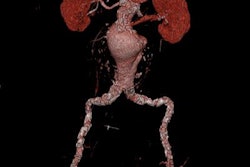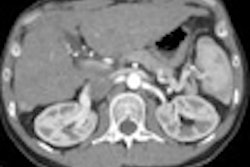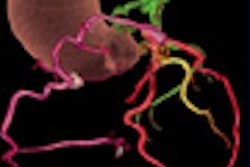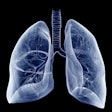(Radiology Review) Contrast-enhanced multidetector-row CT (MDCT) is more sensitive than aortic branch-selective digital subtraction angiography (DSA) for detecting active abdominal bleeding, according to an in vitro study by U.K. researchers.
CT has evolved as the modality of choice for patients suffering from blunt abdominal trauma, according to Dr. Shuvro Roy-Choudhury and colleagues at Guy's and St. Thomas' NHS Foundation Trust in London. They used an in vitro model to assess active contrast extravasation, which indicates abdominal bleeding and the need for intervention, they said. Their results are published in the American Journal of Roentgenology (October 2007, Vol. 189:4, pp. W238-W246).
Because in vivo comparison of imaging modalities in these patients is compromised by variable and intermittent blood loss, they used a test phantom attached to a pulsatile heart-lung circuit to simulate the abdominal arteries and veins.
They compared the sensitivity and lowest threshold of bleeding using 16-slice MDCT (MX8000 IDT, Philips Medical Systems, Andover, MA) with DSA (V3000, Philips Medical Systems). Different flow rates and mean arterial pressure were used to simulate physiologic dilution of IV contrast medium. "The leakage rates were predetermined with a cardiac output of 2 and 4 L/min and with a mean arterial pressure ranging from 30 to 100 mm Hg for each hole size," they stated.
When the catheter was placed at the leakage site, the lowest threshold was 0.35 mL/min for IV contrast-enhanced MDCT compared with 0.05 mL/sec for DSA. When the catheter was placed 10 cm proximal to the leakage site, the lowest threshold was 0.96 mL/min for DSA. Intra-arterial selective MDCT showed a threshold of 0.05 mL/sec or lower.
"For detection of occult gastrointestinal hemorrhage, CT mesenteric arteriography should be considered in which CT is performed after contrast injection through a catheter placed in the aorta or superior mesenteric artery," the authors wrote.
IV contrast-enhanced MDCT is now routinely performed at Guy's and St. Thomas' hospitals for patients suspected of acute lower gastrointestinal bleeding. They obtain "unenhanced, arterial, and delayed series of images and use water as oral contrast medium before triaging to surgery or angiography," they reported.
"Relative Threshold of Detection of Active Arterial Bleeding: In Vitro Comparison of MDCT and Digital Subtraction Angiography"
Shuvro H. Roy-Choudhury et al
Department of Radiology, Guy's and St. Thomas' NHS Foundation Trust, London
AJR 2007 (October); 189:W238-W246
By Radiology Review
December 11, 2007
Copyright © 2007 AuntMinnie.com



















